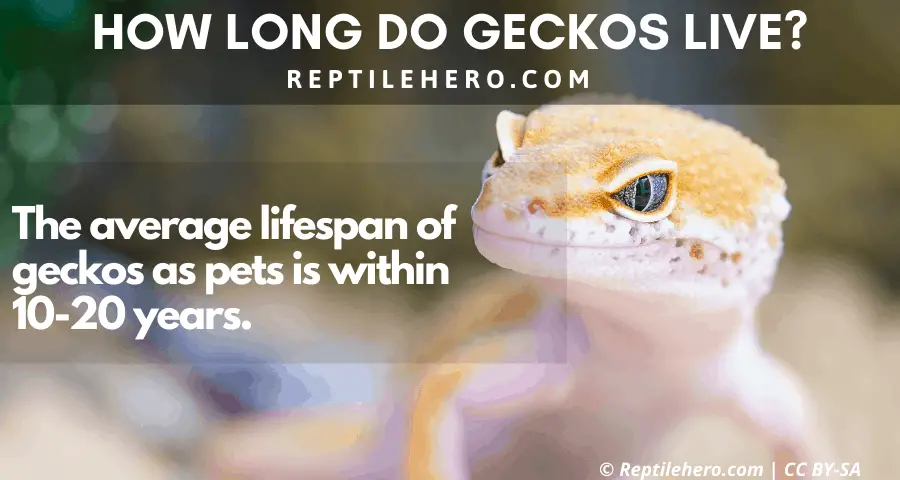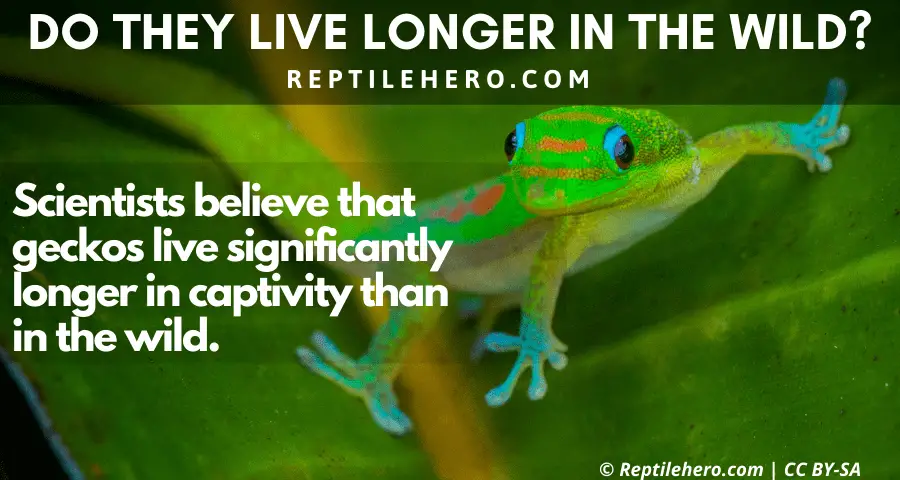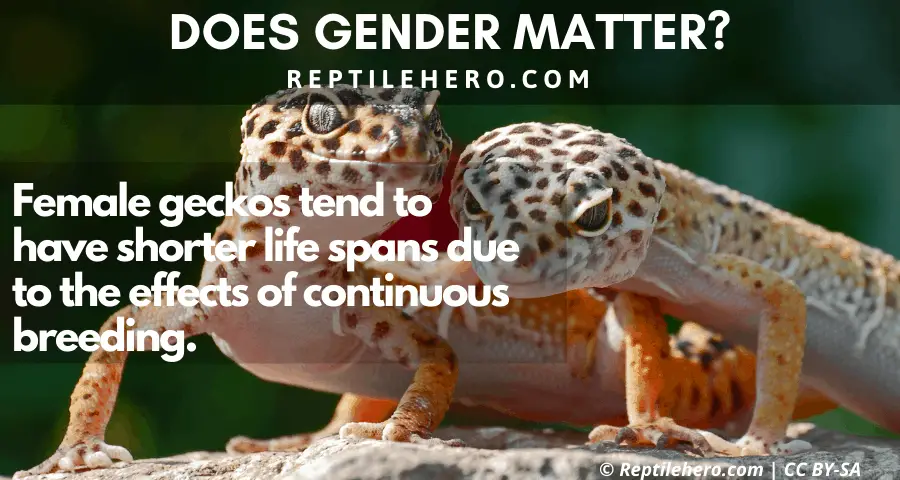How Long Do Geckos Live? (Records, Stages, and More)
When looking for a pet reptile, getting a gecko is one of the most popular choices out there, especially for beginners. But just like in getting any pet, one thing you would want to consider is how long they should live and how you can help them live those years to the fullest.
Geckos as pets live an average of 10-20 years but some geckos have lived well past this range. Other factors are the gecko’s gender and whether it lives in the wild or in captivity. Still, since geckos are relatively new to the pet trade industry, we still have much to discover about their lifespan.
Let us dig deeper into this topic in the sections below.
The Lifespan Of A Gecko
In general, it is a little tricky to come up with a fixed range for all geckos– as of now, there are about 1,500 species under the superfamily Gekotta, spread across the seven families of geckos, including legless ones (Pygopodidae). Thankfully, when it comes to learning about those we usually keep as pets, many breeders, curators, and more experienced pet owners can still give us some insights on how long we can expect to keep these geckos happy and healthy.

To start off, we are going to look at seven of the most common geckos kept as pets.
It may be confusing at first as different resources would have different estimates. This may be due to different locations, exposures, and the fact that geckos are still relatively new choices for pets and thus what we know about their lifespans are still very flexible and dependent on how each of them are cared for (which we are also still studying how to best do!).
But after taking note of the similarities, overlaps in ranges, and doing further research on each species, their lifespans as of now can be best summarized below.

| Gecko Species | Scientific Name | Average Lifespan (Captivity) |
|---|---|---|
| Leopard geckos | Eublepharis macularius | 10 to 20 years |
| Crested geckos | Correlophus ciliatus | 10 to 20 years |
| Fat-tailed geckos | Hemitheconyx caudicinctus | 10 to 20 years |
| Day geckos | Phelsuma grandis | Until 15 years |
| Gargoyle geckos | Rhacodactylus auriculatus | 15 to 20 years |
| Leachianus (leachie) geckos | Rhacodactylus leachianus | Until 20 years |
| Tokay geckos | Gekko gecko | 7 to 10 years |
From this, we can most likely place the average lifespan of a pet gecko at around 10 to 20 years, meaning that most of them are long-lived and should be considered a long-term commitment before getting one.
In The Wild vs In Captivity
Although it is not certain, it is believed by many experts that gecko in the wild lives fewer years than in captivity.
While there is not a lot of data for all gecko lifespans in the wild, there are resources that estimate the lifespan of geckos in the wild, particularly leopard geckos and fat-tailed geckos, to be up until 15 years, which is shorter than what is estimated for them in captivity.

Scientists believe the same for the tokay gecko, that while its lifespan in the wild is still unknown, it should be shorter than their 7 to 10 years in captivity.
Scientists believe that while its lifespan in the wild is still unknown, tokay geckos should less live than 7 to 10 years of what they live in captivity.
Source
There are many possible reasons why these geckos have a better shot at a longer life when they are kept as pets, the main ones being they do not need to hunt for food as much, they are safer from potential predators, and that we are here to take care of them and give them proper treatment for any diseases.
A from Israel Journal of Zoology supports this observation, reporting maximum longevity ranging from 1.5 to 17.5 years among their sample geckos after these have been captured as adults. Also, among the 55 species and subspecies of geckos that they studied, they reported 8 of them to have lived a total of 20 to 37 years.
This may explain why some gecko species have a relatively shorter lifespan than others, especially if they are typically found in the wild. For example, common household geckos are known to live an average of 5 years and are often left alone to scurry on their own instead of kept as pets. Also, this better highlights the impact of the kind of care and maintenance we give to these geckos, as this will make or break their chances of living up to their old age.
Does Gender Matter?

When it comes to leopard geckos, male ones are known to commonly live up to 15-20 years, while female geckos are usually estimated to live only within 6-10 years, especially when they are bred.
Does breeding have an impact on their lifespans?
Giving birth to offspring tends to cause a certain strain on a female’s body especially when they go through continuous breeding. This is known to shorter female gecko lifespan.
Also, they have a tendency to refuse food while they are ovulating and tend to lose weight in the process, unlike when geckos go through brumation. Female leopard geckos tend to not eat unless the eggs have either been laid or reabsorbed (which can no longer be done if the eggs develop shells already).
Because of this, it is advised to feed them more regularly especially before their ovulating season in order to prevent them from losing dangerous amounts of weight during that period. They may also still be given vitamins and minerals to keep them stronger. It would also be helpful to regularly weigh your female leopard geckos in order to see any patterns in their weight loss and gain and so that you would be more prepared when their season starts.
These Geckos Beat The Odds
While our estimate of 10-20 years for pet geckos may be fair and logical, it is still worth considering that there are still reports of geckos out there which have lived way beyond these years.
The longest living leopard gecko is 28 years old
In 2004, the known record or the oldest leopard gecko was 28 years old. However, many gecko enthusiasts also know that herpetologist Ron Tremper (pioneer especially in leopard gecko morphs, the namesake of the Tremper leopard gecko, and author of Leopard Geckos: The Next Generations) once owned a leopard gecko that was able to live up to 31 years old (and almost reaching 32), the gecko being born in 1981. He was also able to raise a female leopard gecko up until 21 years old, provided that it was never bred and was housed alone.
This information is mentioned in the video below, when Amazing Planet reached out to him via email to ask about the leopard gecko’s lifespan:
Aside from this, New Zealand geckos broke records in 2015 for being the longest living geckos. When he first started recording geckos Motunau Island, the late Dr. Tony Whitaker had cut off toes from the first geckos he had seen there.
According to their Department of Conservation, some of these geckos were then found to still be alive after a few years, the oldest of which would be at least 53 years old.
In addition to this, four other geckos in the area were reported to be 47-50 years old. According to reliable sources geckos can live up to at least 42 years old.
Gecko Life Stages
Geckos go through 4 different life stages:
- Egg Stage
- Hatchling Stage
- Juvenile Stage
- Adult Stage
Geckos also do not go through metamorphosis and thus are already born with the same features they would have as adults, only that they grow in size as they age. So how can we tell when our geckos are going through these stages? Ages may be hard to pinpoint when we do not know the exact birth of our geckos, but we can still make educated estimates based on the other signs of their growth.
| Gecko Life Stage | Usual Age Range | Ave. Length (in) | Ave. Weight (g) | Other usual signs |
|---|---|---|---|---|
| Egg Stage | 2-3 months | – | – | Infertile eggs tend to be yellowish |
| Hatchling Stage | 5-7 days | 2-4 in | 2-3g | They first absorb remaining yolk and their first shed skin which will stimulate their appetite for their first adult meal |
| Juvenile Stage | Until 10-12 months | 4-7 in | 3-30g | They focus on growing in size until adulthood |
| Adult Stage | 12-18 months | 7-11 in | 30-120g (for leopard geckos, min weight is about 40g) | 1 year old geckos lose bands and better develop their morphs, they become sexually mature |
It should be noted that these values (especially average length and weight) will vary depending on each gecko species (crested geckos are usually only 5 inches long as adults while leopard geckos reach until 8-11 inches), but the same stages and patterns can apply to our gecko pets in general.
Here we can see that geckos develop and mature rather quickly to their adult stage. After hatching, they are left alone for about a week to feed off the remaining nutrients from their eggs and to undergo their first shedding. Once they feed off their first shed skin, this will stimulate their appetite, making them ready for their first adult meal, which will be their diet as juveniles until they are fully grown.
Also, weight determines sexual maturity rather than age, so it is an important consideration before breeding geckos– for example, it is safest for crested geckos to be bred at least 35g, while leopard geckos should be at around 45g or heavier.
This is why for some, geckos are considered fully developed by the time they reach at least 1 year. Still, the common rule of thumb is that geckos reach the end of their juvenile stage at 18 months as this is when they usually reach their peak growth and are at the ideal weight for breeding.
Can Size Determine Age?
The short answer is yes, but only as rough guidelines to understand your pet’s health.
There are many sites offering growth charts for what would be the ideal weight for a gecko given a specific species and age, but just like how one gecko owner puts it after comparing the charts with his own gecko’s growth, this method of estimating age can be very imprecise.
As also supported by this study on growth rate variations in captive geckos, their sizes will still primarily depend on their individual diet, incubation, husbandry, as well as whether they are undergoing a season of brumation or ovulation.
If we think about it, they are like us humans in that our heights and weights are more relevant in telling us about our health rather than our age.
Still, regular weighing of geckos is advised for pet owners as the pattern of their weight loss and gain tells us important information such as what dose of supplements and minerals is needed for their diet, whether they are sick or ovulating, etc.
Much Is Still Uncertain
As reptiles and amphibians slowly become more popular as pets, it is refreshing to see many more sites, youtube channels, and forums become active and provide care guides, tips, and more information that help us take care of our pet geckos best. Still, we have to remember that since these creatures are quite new in pet trade, what we know for sure about them is still limited– and such can be said about their lifespans, as many gecko species are still just being discovered in recent years.
For instance, crested geckos were discovered in 1866, then believed to be extinct until they were rediscovered in 1994. That means that as of now, we have only been well-exposed to them and potentially cared for them in captivity for about 26 years, making it hard to estimate whether these geckos can live past that number.
Aside from this, different gecko species are still being discovered consistently, some of them even going unnoticed over the years even if they are hidden in plain sight. Just to name some of the new species discovered this 2020, we have the new species of dwarf geckos in both the Western and Eastern Ghats in India, a new bent-toed gecko on a mountain in northern Cambodia, and a unique genus of false geckos in the Philippines.
With this, it seems that while thankfully we still have information right now on how to take care of geckos best, we still have many years ahead of us to learn more about them in full.
Takeaways
- On average, geckos live about 10-20 years when they are raised in captivity.
- Not much data is available for their lifespans in the wild, but scientists believe that it should be shorter compared to when they live in captivity.
- Continuous breeding in females can also affect their health and can have shortened their lifespans, so proper care for female geckos should be observed especially when they are ovulating.
- Since geckos are relatively new in the pet industry and many species are yet to be discovered, there is still much for us to learn and discover when it comes to how long they can live.




![5 Causes of Denting on Your Gecko Eggs [and 4 Solutions]](https://www.reptilehero.com/wp-content/uploads/2021/03/G38-768x614.jpg)
![Are Terrariums and Vivariums the Same? [6 Differences]](https://www.reptilehero.com/wp-content/uploads/2021/06/Terrarium-vs-Vivarium-768x614.jpg)

